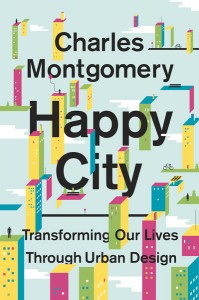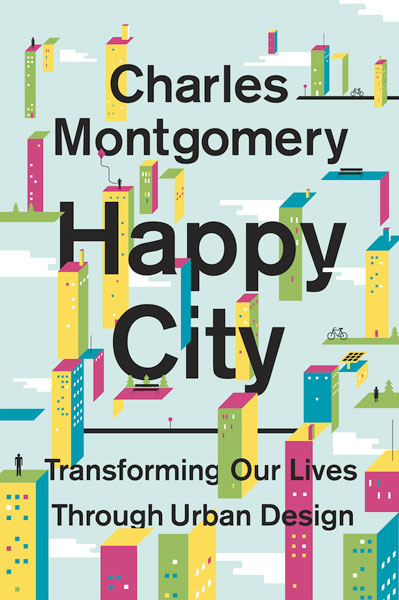 Over the summer holiday I got to catch up on some reading. My favourite was an inspirational book called Happy City, by Charles Montgomery. I was already familiar with much of the content and many of the people who figure in the book, as it canvasses a lot of urban design and transportation planning history. What is novel and important is the re-framing of the debate around what we really value.
Over the summer holiday I got to catch up on some reading. My favourite was an inspirational book called Happy City, by Charles Montgomery. I was already familiar with much of the content and many of the people who figure in the book, as it canvasses a lot of urban design and transportation planning history. What is novel and important is the re-framing of the debate around what we really value.
Usually when I talk about smart, green transport publicly, I focus on values that have long dominated decision-making in that field and the mainstream political discourse. I talk about value for money, efficiency, and economic development. I talk about reducing congestion because it is commonly assumed that congestion is the worst problem facing our transport system, and that value for money and the economy are the highest aims public policy should strive for.
I find explaining green transport benefits in values more widely accepted than green values is useful to win support from people who don’t already agree with us. But in his book, Montgomery challenges the accepted superiority of value for money and economic productivity, and he is right to do so. These values are not wrong. I do care about efficiency and getting value for money, but only as one possible way to achieve a much bigger goal.
Money and the economy are not ends in themselves. It is happiness, health and contentment that all of us are really striving for.
Happy City begins with a thorough assessment of the new science of happiness, and contrasts it with the prevailing dogma that higher incomes and purchasing power are equivalent to well-being. The Green Party and others have long advocated for more integrated systems of measurement, such as the Genuine Progress Indicator (GPI) in lieu of Gross Domestic Product (GDP), so this will not be news to many of you.
The fantastic news laid out in Montgomery’s book is that there is a growing cross-disciplinary cohort of experts studying happiness, incorporating neuroscience, psychology, and economics. The reliable data available makes it quite clear that once humans achieve a basic level of income, enough to ensure they have essentials like a warm, healthy home, enough to eat, and opportunities for meaningful social interaction, each additional dollar they work for has diminishing returns. So happiness and well-being are not perfectly correlated with rising incomes and purchasing power. This is an age-old truism. You can’t buy love or happiness.
One of the most interesting observations from the new sciences of happiness is that relationships are one of the key determinants of happiness. And not only close relationships with people we know and see everyday. Residents in cities where there is a high level of trust between strangers are happier than people in cities where there is a very low level of trust.
The book makes the case that towns and cities have the potential to be engines of happiness, if they are designed for people. Enrique Peñalosa, former mayor of Bogota, revolutionised that city during his time in office. He was successful in making people healthier, happier, and making the city more democratic. He achieved this in a large part through a different approach to transport. He threw open the largest public spaces in the city — the streets — to everyone. By ditching the dominant traffic engineering approach of prioritising private vehicles in road space and transport funding, he brought the city to life for people (and many other living things).
Happy people are more trusting, more generous, more collaborative and more able to deal with the ecological challenges we face, a point well made in Niki Harré’s book, Psychology for a Better World. This suggests that the best way to grow the green movement long term is to transform the neighbourhoods where people live to support happiness. Like Peñalosa concluded in Bogota, we may not be able to change everything straight away, but we can empower disadvantaged communities and give them opportunities to be happier and better connected by prioritising fantastic urban spaces in towns and cities of all sizes. Ultimately this will enable the type of civic participation that will create a bigger constituency for more progressive change in the future.






Just got a copy of the book, but Peñalosa has been an inspiration for a while now.
One of his first acts as mayor was to use the public works act to obtain a golf course in the middle of the city to provide much needed green space to the wider public.
His work proves that housing, transport and communities are inextricably linked and the decisions made in silos on these issues are flawed and lead to failure.
I’m in New York at the moment and have been absolutely amazed at the sense of community here. This is known as a chaotic city and it is to an extent but when someone elderly gets on a subway train it seems there is a competition to get off your seat and provide it for them!
Previous to New York I was in the state of Oklahoma. I have never met a bunch of more polite people in all my life. All you have to do is look like you might walk into the same path as someone else and you get a polite excuse me. The manners and the way the people talk to you there is on a whole different level compared with New Zealand.
It just goes to show that the Green Party is on the wrong track. What we need is less government is our lives. We need to empower people to decide for themselves how they wish to treat their fellow citizens. The people will soon work out to treat others with the respect you wish to be treated with and a culture will develop.
We don’t need schools as community hubs, we don’t need more legislation. What we need is the opportunity to live our lives and develop a New Zealand culture.
Matthew, I don’t understand how you can claim a link between manners and the type of government a country has. America has given us Julie Anne and I’d like to say thank you. You are an awesome young woman Julie Anne, your contributions to the debate here, and in Parliament, are intelligent, polite and sound. Kia kaha, Arohanui.
You didn’t actually have a cogent argument there Matthew.
Putting anecdotal paragraphs in front of an unconnected conclusion, and then attaching it to a previously non-introduced entity is not only confusing, it is confused.
Comments are closed.